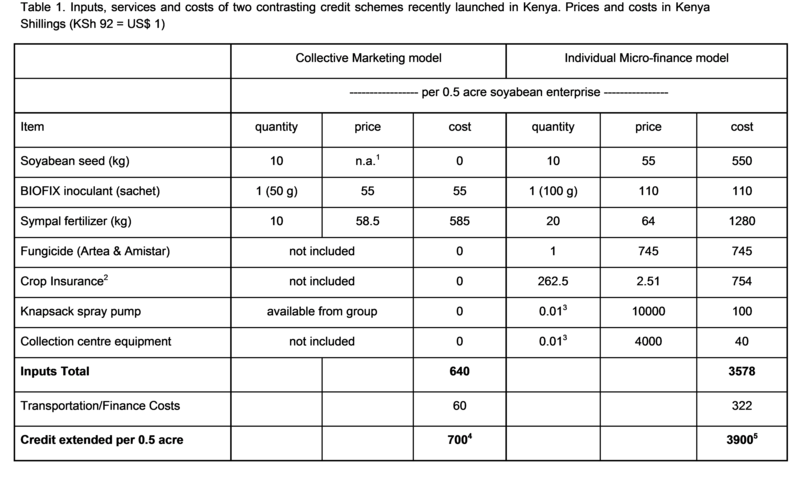An important N2Africa milestone relating to dissemination activities is linking at least half of the participating communities to markets before the end of Year 2 (Milestone 4.3.3). In Kenya, we have undertaken this goal in a systematic manner. First the demand for soyabeans was assessed and likely buyers contacted. There are more than 40 companies in Kenya utilizing soyabean as an industrial raw material with national demand estimated at 150,000 tons per year and meeting part of this deficit offers an excellent market entry opportunity. Nearly all of these soyabeans are being imported from Brazil, Uganda or India; the key is to convince Kenyan buyers that local soyabeans can be reliably substituted for imported ones and delivered to factory gates at a lower price. Some of these buyers processing between 40 and 80 tons per week are extremely interested in this opportunity with one such buyer issuing a 4000 ton tender for February 2012 (Promasidor, makers of SOSSI textured vegetable protein, see photo).
Next we must assure that this demand be met and that necessary inputs are available. N2Africa scientists formulated a fertilizer blend for symbiotic grain legumes (Sympal 0-23-16 with S, Ca and Mg) that was commercialized by MEA Fertilizers Ltd and marketed for about US$ 0.63 per kg in 2, 10 and 50 kg bags. MEA also produces BIOFIX rhizobium inoculants packaged in 20, 50 and 100 g sachets available at a cost of about US$ 12.20 per kg. In this way, we are able to meet the fertilizer and inoculant needs of the project’s “progressing” farmers.
A more difficult challenge is the availability of soyabean seed because it is not commercially available, rather it must be bulked by project partners. Smart Logistics is a Kenyan company that provides quality control, grain bulking and transportation services to food processors in Kenya and has partnered with N2Africa and Promasidor to meet the announced tender. Smart Logistics, assisted by our sister TL2 project, announced it would buy quality soyabean seed for US$ 0.61 per kg, about 20% above the world market price. N2Africa designed a technology package to process and test these seed (see photograph) and N2Africa cooperators responded by assembling about 39 tons of seed worth about US$ 24,000. Twenty (80%) N2Africa outreach cooperators in 10 counties of west Kenya participated in soyabean seed processing and sales. The twist is that Smart Logistics did not take physical possession of the seeds, rather it left them with N2Africa grassroots groups to replant the following season in order to meet the Promasidor tender.
Together, Smart Logistics and N2Africa designed two contrasting input supply and marketing models; one more comprehensive based upon microfinance opportunity to individual farmers and another less complex approach enabling local farmer groups to extend inputs on credit to members and then market their resulting surplus (see Table 1). The microfinance approach includes part ownership in a sprayer and chemicals to precautionary control soyabean rust as well as enrollment in a climate-based crop insurance program involving partnership with Syngenta. The collective marketing approach has provided sprayers to farmer groups and offered training in disease identification and treatment (again by Syngenta) but assumes that farmers will diagnose and treat pest and disease according to local conditions and will bear the risk of crop failure.

The current growing season has just begun in west Kenya with 1500 households growing 300 ha of soyabeans participating in collective marketing and an additional 1260 micro-financed households cultivating 483 ha. The collective marketing model is being explored by 71% of our partner groups and the microfinance option undertaken by 25% of them. Because of its reduced inputs and services, the collective marketing model is expected to yield about 1100 kg grain per ha, offer net returns of US$ 102 per half acre and provide a return on investment of about 14:1 (not including seed, fungicide and labor costs) while the microfinance approach should offer 1750 kg per ha, US$ 134 per 0.5 acre field and 4.3:1 return, respectively. All together, we hope to market 1175 tons of soyabean worth about US$ 602,000, but this is extremely speculative until we see how the season progresses. Clearly, the N2Africa Dissemination team in Kenya has forged key links with private sector input suppliers and buyers and is undertaking an ambitious plan for marketing soyabeans early in Year 3. The team has made less progress, however, in developing market linkages for climbing bean, its other target grain legume. This discrepancy is due to the strong local demand for beans in west Kenya leading to higher prices throughout the year compared to larger urban areas. Future attempts at marketing climbing bean will focus upon shelled fresh beans that command a much higher market price through the creation of a network-wide interest group during Year 3. Smart Logistics has already expressed interest in working with us in this area as well.
Paul Woomer (N2Africa Project), Edgar Kadenge (TL2 Project), Jane Wanza (Smart Logistics) and Paul Rose (Promasidor)
